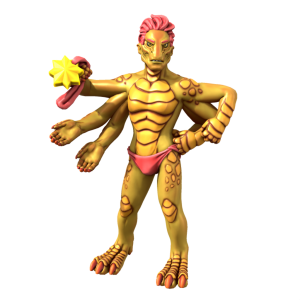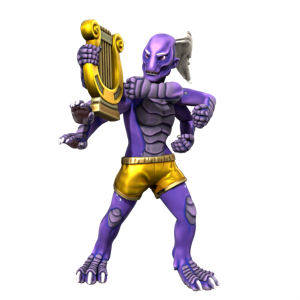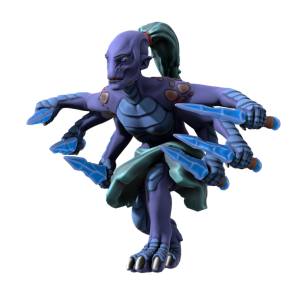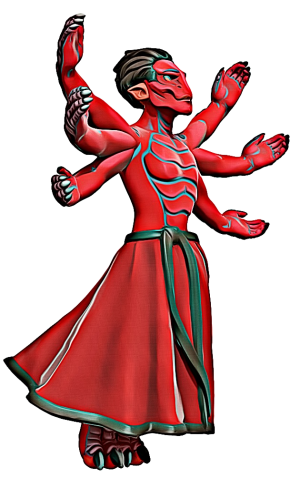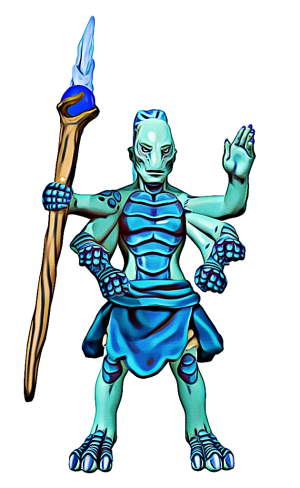Deities in Sewoch
While deities do exist for the Sewoch, they are not at all similar to Otani deities. In Otan deities live on another plane of existence, creating, destroying and interceding in the lives of mortals on their own whims. In Sewoch, the deities are ever present and always ready to converse with the faithful.
Sewochi deities are never intercessors. They do engage in whimsical activity, much as do the deities of Otan, however, they never interfere in the affairs of mortals. They set examples, and give detailed instructions to mortals on how to achieve a state of Temokiro. They are said to be an a continuous state of Temokiro themselves, even when engaged in whimsical affairs.
The other major difference with Sewochi deities is that they are shared across the two leading Sewochi religions. Practitioners of both Medigemi and Kilesa may call on the same deity for different reasons, but both acknowledge the same group of deities.
Arenigwade[edit]
Arenigwade is the god of love and self love. He is a jealous god, however, and is quick to stir to extreme emotions. At best Arenigwade will help the penitent to align their feelings for sexual and fraternal love into a positive step toward Temokiro. At worst, Arenigwade will enrage his followers into fits of anger and jealousy. It is said that this god brings the highest highs and the lowest lows of any of the Sewochi gods.
Arenigwade guides his followers toward love, an necessary step in the path to Temokiro. Followers must learn to love themselves, to love others, to love the path that they are on and most of all, the experience of love. Like their god, followers of Arenigwade will see their love quickly turn to anger if their paths toward love, and ultimately Temokiro, is blocked. These followers will lose their anger completely and immediately once the path is unblocked, and will return to the activity that increased their feelings of love.
Important steps in the path of Arenigwade include the mastering the experiences of:
- Love of self
- Love of others
- Love of community
- Love of universe
- Love of experience
Bicha[edit]
Bicha is the god of the Sun and the god of intellect. Bicha is depicted as a condescending god, taking pity on the less intelligent gods for their lack of knowledge or understanding. Even when others do understand, Bicha will take the natural stance that they do not understand things well enough to be of a concern. He will not tolerate those who try to correct him on the very rare occasions that he gets something wrong. His path to Temokiro is through a complete understanding of the universe.
Followers of Bicha believe that all knowledge comes from within and that they have 'a priori knowledge of all things in the universe. These followers will nonetheless, take up in-depth studies to remind their forgetful spirits of that knowledge they might have set aside. Bicha's followers will spend much of their time reading, studying nature and the movement of the sun, stars and planets. They achieve the state of Temokiro not when they understand, but fully experience the knowledge that they understand. This is done trough a combination of meditation and empirical observations.
Important steps in the path of Bicha include mastering the experiences of:
- Understanding the motion of Sewoch, the Sun, and the heavens
- Understanding the natural path from birth to death
- Understanding the relationships between elements
- Understanding causality (or lack thereof)
- Understanding the intricacies of time
Biritukanama[edit]
Biritukanama is the god of passion, sexuality and self-expression. Depicted as an orange-skinned god, Biritukanama will often pursue other gods for sex or other acts of intimacy. Sewoch gods being without gender or sexual orientation, gives Biritukanama a dual reputation, that of a welcome visitor and that of an unwelcome annoyance.
Biritukanama will announce his intentions for intimacy by thrusting their spear in the ground and proceeding to make love. Mortals, of course, may not resist the advances of a god, but the gods themselves may make protests, about which many legends have been written. Followers of Biritukanama are often found engaging in sexual activity for the simple purpose of experiencing an advancement toward Temokiro, and no interest in procreation.
Followers of the way of Biritukanama will eventually achieve Temokiro through self-expression, intimacy, sexual acts, and creativity. Followers may take up arts such as painting, music and drama to enhance their paths to Temokiro. Their paths will include the following experiences:
- Passion for the arts
- Passion for intimacy
- Passion for sexual congress
- Passion for appreciation (for sexual or artistic merit)
- Passion for creation of the unique
Hamirawi[edit]
Hamirawi is depicted as a purple-skinned goddess who carries a lyre. While technically genderless, Hamirawi is often described as a precocious female, decrying the folly of all the other gods with their many varied and complicated paths to Temokiro. While Hamirawi plays her magical lyre, which has various effects on gods and mortals alike, she easily achieves the path to Temokiro by playing the Perfect Note. In legends, Hamirawi has been known to give the gift of Temokiro to those around her with this note.
Followers of Hamirawi will often take a keen interest in music, which has within it, various paths to Temokiro other than the one Perfect Note. Because of this comparatively quick path to Temokiro, her followers will engage in seemingly superfluous passions including a desire to commune with the divine. Followers of the way of Hamirawi will meditate on the oneness of all living things and their ultimate role in the universe. It is said that this in itself provides them a second path to Temokiro.
Followers of the path of Hamirawi will seek to experience the following:
- Knowledge of the spirit
- Knowledge of the connectedness of all spirits
- Knowledge of the divine
- Knowledge of the connectedness of the spirit and divine
- Knowledge of harmony
- Knowledge of the Perfect Note
Inigogo[edit]
Inigogo is depicted as an dark-blue skinned warrior, often of female gender (though genderless), carrying a dagger of ice in each hand. The daggers are symbolic of a useless weapon, that can create fear but has no practicality. In the legendary tales, Inigogo carries the daggers to frighten off those who would steal her joy. For Inigogo, joy is the only true path to Temokiro. While the other gods engage in various activities such as learning, sex, or creation, Temokiro might take up any or all of these activities. She does not reach Temokiro from the experiences themselves, but rather from the experience of joy that they bring.
Followers of Inigogo are simultaneously the most and least happy of all the penitent in Sewoch. It is their passion to seek joy, but cab be great disappointment when joy is not achieved. Seemingly unending amounts of time can be spent pursuing an activity which brings no joy at all, while sometimes joy can be sparked on a whim. To seek the experience of pure joy is a difficult path. There is a benefit, however, to the path of Inigogo which is not experienced by followers of other gods. The path of Inigogo is not only rewarded with Temokiro, but also with a window to the divine.
Followers of the path of Inigogo will attempt to experience the following joys:
- Joy of understanding
- Joy of love
- Joy of sexual congress
- Joy of mutual benefits
- Joy of creation
- Joy of connection to the divine
Keyi[edit]
Keyi is the god of serenity, harmony and stability. He is often depicted as a red skinned god with open arms. In legends his actions will invariably have him resolving differences between the other gods or gods and mortals. His path to Temokiro involved the full realization of his own power to remain calm in a crisis. This path has a dual benefit, in that crises are resolved while Temokiro is achieved.
Followers of the path of Keyi do not have things so easy. To experience stability without an outside influence is an easy test; in the face of nothing, it is simple to do nothing. A display of stability, therefore requires a stimulus that will upset stability. Followers of Keyi will therefore put themselves in hazardous situations where they might experience physical harm or even death to practice their ability to remain serene.
Practitioners of the path of Keyi will work toward Temokiro by experiencing the following:
- Serenity in the midst of conflict
- Serenity in the midst of danger
- Serenity in the grip of hunger
- Serenity after loss
- Serenity during pandemonium
- Serenity in the presence of the divine
Meweledi[edit]
Meweledi is the god of birth, childhood and play. He is most often depicted as a cherubic pink-skinned youth, getting into various kinds of mischief. He is said to be in a constant state of Temokiro, lacking the understanding of how to be in any other state. His playfulness and churlishness keeps him in this state while the other gods toil in more serious activities. In legends, Meweledi will often confound the other gods by playing jokes on them or causing them grievous insults. They can not answer these insults, of course because Meweledi is just a child, and suffer them with ignominy.
Followers of Meweledi can be every bit as precocious as their god. They take delight in playing tricks on others. They also take delight, while working toward Temokiro, in all forms of play. This play can involve anything from formal games and sports, to simple imaginary games with toys or other objects as the stand-ins for imaginary people and things. Followers of Meweledi will dance, attempt acrobatics beyond their abilities, create art that is objectively ridiculous and revel in practical jokes.
Considered buffons and undesirable company by most Sewochi, the followers of Meweledi will achieve Temokiro in the following endeavors:
- Playfulness in dance
- Playfulness in imaginary games
- Playfulness in story telling
- Playfulness in practical jokes
- Playfulness in role playing
- Playfulness in silly acrobatics
Moti[edit]
Moti is the god of fear; the death bringer, who brings death and decay to all creatures and things. Rarely the most desired guest at a gathering, Moti is ever present in Sewochi legends. He faces each of the other gods and their followers on their own terms as he can emulate all of them on their paths to Temokiro with just a hint of sadness as he meets them at the end of their path. Moti is said to be in a state that transcends even Temokiro because of his intimate understanding of what lies beyond life itself.
Those crazy enough to follow of Moti not only seek Temokiro, but also seek the understanding of what is beyond Temokiro. They do this by understanding fear and death. They accomplish their understanding of fear by placing themselves in fearful situations, those that could often lead to death. Each time they experience fear it is assumed that they move closer to Temokiro. Ultimately they will plan their own deaths as their final experience.
Before their final act of faith, however, followers Moti of will practice death by placing themselves into near-death experiences. They achieve this via a light version involving asphyxiation through choking or drowning. To increase the level of fear, while decreasing their chances of survival, they will attempt a near-death experience through blood-letting or poison. These methods are sometimes irreversible and it is impossible to tell if the over-bled or over-dosed victim is able to achieve and/or surpass Temokiro.
Followers of Moti will take steps to experience the following:
- Fear of silence
- Fear of abandonment
- Fear of loss
- Fear of emotional and physical pain
- Fear of humiliation
- Fear of death
Semayawi[edit]
Semayawi is the goddess of empathy and sorrow. While gods are genderless, Semayawi is often depicted as a blue-skinned woman with the six-armed physique of the godhood. In Sewochi legend she is known as the consoler, having the divine ability to understand the difficulties of others and objectively help them toward a solution. Semayawi's path to Temokiro is in many ways the simplest; she simply understands and thus learns the ways of others.
Followers of Semayawi will attempt to reach Temokiro in much the same way. Through empathy and conciliation they will communicate with followers of other gods to try and understand their difficulties. While this seems like a long path, their experience of empathy from various sources can launch them into one of the most fulfilling states of Temokiro possible for a mortal being.
The followers of the way of Semayawi will eventually attempt to have experienced understanding of all emotions through others, particularly those that make a path toward Temokiro. They will attempt the following in their path:
- Empathy for those experiencing joy and playfulness
- Empathy for those experiencing sorrow
- Empathy for those experiencing knowledge and understanding
- Empathy for those experiencing fear
- Empathy for those experiencing serenity
- Empathy for those experiencing passion
- Empathy for those experiencing love
- Empathy for those experiencing birth and death
| Copyright © 2021-2025 by Robyn Blaber and Will to Power Games. All rights reserved. Content on this website may not be reproduced without written permission of the copyright owner. |

